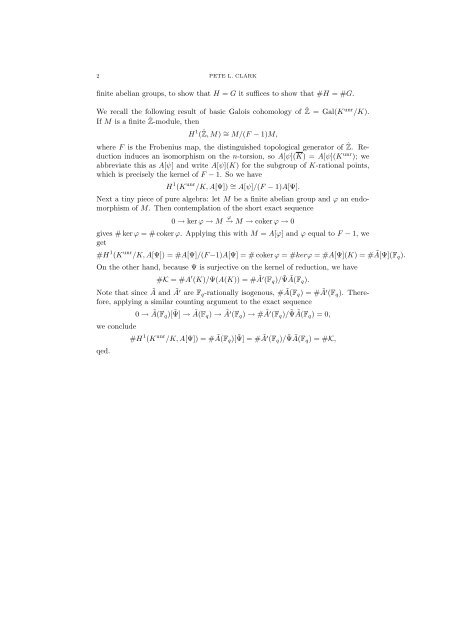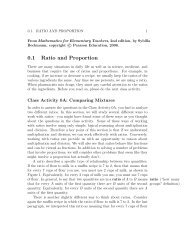CASSELS' LEMMA Theorem 1. (Cassels' Lemma) Let K be a ...
CASSELS' LEMMA Theorem 1. (Cassels' Lemma) Let K be a ...
CASSELS' LEMMA Theorem 1. (Cassels' Lemma) Let K be a ...
Create successful ePaper yourself
Turn your PDF publications into a flip-book with our unique Google optimized e-Paper software.
2 PETE L. CLARK<br />
finite a<strong>be</strong>lian groups, to show that H = G it suffices to show that #H = #G.<br />
We recall the following result of basic Galois cohomology of Ẑ = Gal(Kunr /K).<br />
If M is a finite Ẑ-module, then<br />
H 1 (Ẑ, M) ∼ = M/(F − 1)M,<br />
where F is the Fro<strong>be</strong>nius map, the distinguished topological generator of Ẑ. Reduction<br />
induces an isomorphism on the n-torsion, so A[ψ](K) = A[ψ](K unr ); we<br />
abbreviate this as A[ψ] and write A[ψ](K) for the subgroup of K-rational points,<br />
which is precisely the kernel of F − <strong>1.</strong> So we have<br />
H 1 (K unr /K, A[Ψ]) ∼ = A[ψ]/(F − 1)A[Ψ].<br />
Next a tiny piece of pure algebra: let M <strong>be</strong> a finite a<strong>be</strong>lian group and ϕ an endomorphism<br />
of M. Then contemplation of the short exact sequence<br />
0 → ker ϕ → M ϕ → M → coker ϕ → 0<br />
gives # ker ϕ = # coker ϕ. Applying this with M = A[ϕ] and ϕ equal to F − 1, we<br />
get<br />
#H 1 (K unr /K, A[Ψ]) = #A[Ψ]/(F −1)A[Ψ] = # coker ϕ = #kerϕ = #A[Ψ](K) = #Ã[Ψ](F q).<br />
On the other hand, <strong>be</strong>cause Ψ is surjective on the kernel of reduction, we have<br />
#K = #A ′ (K)/Ψ(A(K)) = #Ã′ (F q )/ ˜ΨÃ(F q).<br />
Note that since à and Ã′ are F q -rationally isogenous, #Ã(F q) = #Ã′ (F q ). Therefore,<br />
applying a similar counting argument to the exact sequence<br />
we conclude<br />
qed.<br />
0 → Ã(F q)[ ˜Ψ] → Ã(F q) → Ã′ (F q ) → #Ã′ (F q )/ ˜ΨÃ(F q) = 0,<br />
#H 1 (K unr /K, A[Ψ]) = #Ã(F q)[ ˜Ψ] = #Ã′ (F q )/ ˜ΨÃ(F q) = #K,



